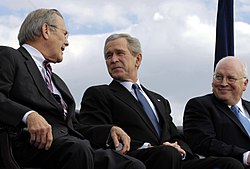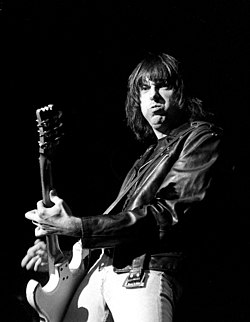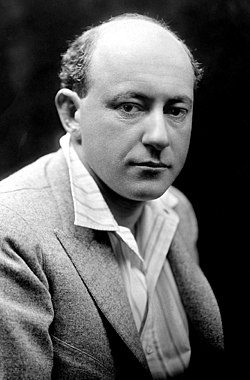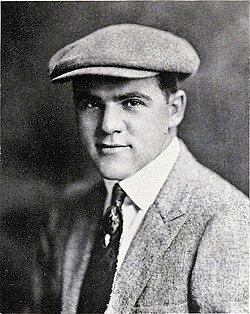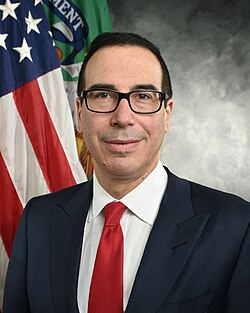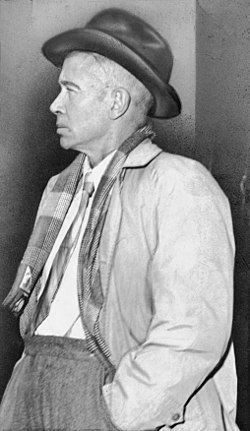| Name | Lifetime | Notability | Ref. |
|---|
| Rupert Hughes | 1872–1956 | Director and writer of films including Gloria's Romance and Souls for Sale | [350] |
| Fred Niblo | 1874–1948 | Director, writer and producer of films including The Red Lily , Ben-Hur: A Tale of the Christ and The Enemy | [351] |
| Frank Craven | 1875–1945 | Writer for films including Sons of the Desert and Our Town | [352] |
| Lionel Barrymore | 1878–1954 | Director of films including Madame X (1929), The Unholy Night , and The Rogue Song | |
| Cecil B. DeMille | 1881–1959 | Director of films including The Greatest Show on Earth and The Ten Commandments (1956) | [348] |
| Donald Crisp | 1882–1974 | Director of films including The Navigator and Don Q, Son of Zorro | [353] |
| Louis B. Mayer | 1882 or 1884 or 1885–1957 | Co-founder of Metro-Goldwyn-Mayer and producer of films including Ben-Hur: A Tale of the Christ and Greed (1924) | [354] |
| Sam Wood | 1883–1949 | Director of films including A Night at the Opera and Kings Row | |
| Raoul Walsh | 1887–1949 | Director of films including The Big Trail , The Roaring Twenties and White Heat | [355] |
| Victor Fleming | 1888–1949 | Director of films including The Wizard of Oz and Gone with the Wind | [356] |
| Maxwell Anderson | 1888–1959 | Writer of films including All Quiet on the Western Front (1930), The Wrong Man , and Ben-Hur (1959) | [357] |
| W. S. Van Dyke | 1889–1943 | Director of films including Tarzan the Ape Man , The Thin Man and San Francisco | [358] |
| Carey Wilson | 1889–1962 | Writer of films including Ben-Hur (1925) and Mutiny on the Bounty and producer of films including The Postman Always Rings Twice and Green Dolphin Street | [359] |
| Cedric Gibbons | 1890–1960 | Art director of films including The Wizard of Oz and Gaslight and designer of the Oscar statuette | [360] |
| Clarence Brown | 1890–1987 | Director of films including Anna Karenina and The Human Comedy | [361] |
| George Marshall | 1891–1975 | Director of films including Destry Rides Again , The Blue Dahlia and How the West Was Won | [362] |
| Hal Roach | 1892–1992 | Producer, writer and director of films including the Laurel and Hardy franchise and Safety Last! | [349] |
| Charles Brackett | 1892–1969 | Writer and producer of films including The Lost Weekend and Sunset Boulevard | [363] |
| Harold Lloyd | 1893–1971 | Writer and producer of films including Safety Last! , The Kid Brother and A Girl, a Guy and a Gob | [364] |
| Howard J. Green | 1893–1965 | Writer of films including The Kid Brother and I Am a Fugitive from a Chain Gang | [365] |
| Merian C. Cooper | 1893–1973 | Director and producer of films including King Kong (1933) and This Is Cinerama | |
| James Kevin McGuinness | 1894–1950 | Writer of films including The Battle of Midway and Rio Grande | |
| John Ford | 1894–1973 | Director of films including The Searchers and The Man Who Shot Liberty Valance | [366] |
| King Vidor | 1894–1982 | Director of films including Northwest Passage and Duel in the Sun | [367] |
| Frank Borzage | 1894–1962 | Director of films including 7th Heaven | [368] |
| Tay Garnett | 1894–1943 | Director of films including China Seas and The Postman Always Rings Twice | [362] |
| James Sibley Watson | 1894–1982 | American experimental filmmaker and director of films including The Fall of the House of Usher | [369] |
| Frank Wead | 1895–1947 | Writer of films including Dive Bomber and They Were Expendable | |
| Morrie Ryskind | 1895–1985 | Writer of films including A Night at the Opera and My Man Godfrey | [370] |
| William A. Wellman | 1896–1975 | Director of films including Beau Geste and The Ox-Bow Incident | [371] |
| Howard Hawks | 1896–1977 | Director of films including Scarface (1932) , Red River (1948) , The Thing from Another World , and Rio Bravo | |
| Walter Lang | 1896–1972 | Director of films including The King and I | [372] |
| Myles Connolly | 1897–1964 | Screenwriter of films including Mr. Smith Goes to Washington and State of the Union (film) | [373] |
| Frank Capra | 1897–1991 | Director of films including It's a Wonderful Life and Mr. Smith Goes to Washington | [374] |
| Preston Sturges | 1898–1959 | Director and writer of films including Sullivan's Travels and The Lady Eve | [375] |
| Leo McCarey | 1898–1969 | Director of films including Duck Soup (1933) and An Affair to Remember | |
| Hal B. Wallis | 1898–1987 | Producer of films including Casablanca , The Adventures of Robin Hood and True Grit | |
| Norman Taurog | 1899–1981 | Director and writer of films including Boys Town and the Elvis Presley Movie Franchise | [376] |
| Irving Thalberg | 1899–1936 | Producer of films including Grand Hotel and A Night at the Opera | [377] |
| James Warner Bellah | 1899–1976 | Writer of films including Fort Apache , She Wore a Yellow Ribbon and The Man Who Shot Liberty Valance | [378] |
| Borden Chase | 1900–1971 | Writer of films including Red River (1948 film) and Winchester '73 | [379] |
| Mervyn LeRoy | 1900–1987 | Director and producer of films including I Am a Fugitive from a Chain Gang and The Wizard of Oz | [380] |
| Mark Sandrich | 1900–1945 | Director and producer of films including Top Hat , Shall We Dance and So Proudly We Hail! | [381] |
| Walt Disney | 1901–1966 | Co-founder of The Walt Disney Company, also animator and film producer, helping to create films which included Snow White and the Seven Dwarfs , Fantasia , Dumbo , Bambi , and Pinocchio (1940) | |
| David O. Selznick | 1902–1965 | Producer and executive producer of films including Gone with the Wind and Rebecca (1940) | |
| John Lee Mahin | 1902–1984 | Writer and producer of films including Captains Courageous and Heaven Knows, Mr. Allison | [382] |
| Fred Niblo Jr. | 1903–1973 | Writer of films including The Criminal Code | [383] |
| Casey Robinson | 1903–1979 | Writer and producer of films including Captain Blood and Now, Voyager | [384] |
| Robert Montgomery | 1904–1981 | Director of films including Ride the Pink Horse , Once More, My Darling , and Your Witness | |
| Martin Berkeley | 1904–1979 | Writer of films including Green Grass of Wyoming and Tarantula | [385] [386] |
| Dick Powell | 1904–1963 | Director of films including Split Second and The Enemy Below | [244] |
| David Butler | 1904–1979 | Director of films including Road to Morocco and Tea for Two | [387] |
| George Stevens | 1904–1975 | Director, writer and producer of films including A Place in the Sun , Shane and Giant and The Greatest Story Ever Told | [388] |
| Howard Hughes | 1905–1976 | Producer of films including Scarface (1932) and The Outlaw | [389] |
| John Wayne | 1907–1979 | Director and producer of films including "Bullfighter and the Lady" and "The Alamo (1960)" | [390] |
| Joseph L. Mankiewicz | 1909–1993 | Director and writer of films including A Letter to Three Wives and All About Eve | [391] |
| Robert Arthur | 1909–1986 | Producer of films including Abbott and Costello Meet Frankenstein and The Big Heat | |
| Jack Webb | 1920–1982 | Creator of the Dragnet franchise | [392] |
| Charlton Heston | 1923–2008 | Director and screenwriter of films including Antony and Cleopatra | [393] |
| Sam Peckinpah | 1925–1984 | Director and screenwriter of films including The Wild Bunch and Straw Dogs | [394] |
| Jerry Lewis | 1926–2017 | Director and writer of films including The Nutty Professor and The Day the Clown Cried | [395] [396] |
| Stanley Kubrick | 1928–1999 | Director of films including Dr. Strangelove , 2001: A Space Odyssey , and The Shining | [397] [398] |
| William Peter Blatty | 1928–2017 | Writer of films including The Exorcist , as well as the director and writer of The Ninth Configuration and The Exorcist III | [399] [400] |
| Roger MacBride | 1929–1995 | Producer of Little House on the Prairie | |
| James Lee Barrett | 1929–1989 | Writer and producer of films including The Greatest Story Ever Told , The Cheyenne Social Club and Smokey and the Bandit | [401] |
| Clint Eastwood | 1930– | Director of films including High Plains Drifter , Unforgiven , Mystic River , Letters from Iwo Jima , Gran Torino , American Sniper , and Richard Jewell | |
| Robert Duvall | 1931– | Director of the film The Apostle and producer of films including A Family Thing , and Crazy Heart | [402] |
| Stan Brakhage | 1933–2003 | American experimental filmmaker and writer of films including Mothlight and Dog Star Man | [403] |
| Gerald R. Molen | 1935– | Producer and executive producer of films including Days of Thunder , Jurassic Park , Schindler's List , Casper , and Twister | [404] |
| Dennis Hopper | 1936–2010 | Director and writer of Easy Rider and The Last Movie | [405] |
| Paul Morrissey | 1938–2024 | Director and writer of films including Women in Revolt , Flesh for Frankenstein , and Blood for Dracula | [406] |
| Lionel Chetwynd | 1940– | Director and writer of The Hanoi Hilton | [404] |
| Michael Crichton | 1942–2008 | Writer of films including the Jurassic Park franchise | [407] [408] |
| D. Keith Mano | 1942–2019 | Writer for episodes on shows including Homicide: Life on the Street , L.A. Law , and St. Elsewhere | [409] |
| Jerry Bruckheimer | 1943– | Producer of film series including Beverly Hills Cop , Pirates of the Caribbean , and National Treasure | |
| Roger L. Simon | 1943– | Screenwriter of films including The Big Fix and Enemies, A Love Story | [404] |
| John Milius | 1944– | Writer of Dirty Harry and Apocalypse Now , directed films including Conan the Barbarian (1982) and Red Dawn | |
| Ivan Reitman | 1946–2022 | Director of films including Ghostbusters , Ghostbusters II , Kindergarten Cop , and Dave | [410] |
| Sylvester Stallone | 1946– | Writer of films including Rocky, Rambo, and Cobra and director of films including Rocky IV and The Expendables | [411] |
| David Lynch | 1946–2025 | Director of films including Eraserhead , Blue Velvet, The Straight Story , and Mulholland Drive | [412] |
| James Woods | 1947– | Producer of Cop and Another Day in Paradise ; executive producer of Northfork and Oppenheimer | |
| David Zucker | 1947– | Director and writer of Airplane! and The Naked Gun: From the Files of Police Squad! | [405] |
| David Mamet | 1947– | Director and writer of Heist (2001) , as well as the writer of films including The Untouchables , Glengarry Glen Ross , Wag the Dog , and Hannibal (2001) | [413] |
| Arnold Schwarzenegger | 1947– | Producer of films including Maggie and Aftermath; executive producer of Last Action Hero , former Governor of California (2003–2011) | [414] |
| John Swartzwelder | 1949– | Writer and producer for The Simpsons | [415] |
| John Hughes | 1950–2009 | Director and writer of films including Sixteen Candles , Weird Science , The Breakfast Club , Ferris Bueller's Day Off , and Planes, Trains and Automobiles | [416] [417] |
| Bob Gale | 1951– | Writer and producer of films including the Back to the Future series | |
| Whit Stillman | 1952– | Director of Metropolitan, Barcelona, and The Last Days of Disco | [418] |
| Roseanne Barr | 1952– | Executive producer of Roseanne | [419] |
| Robert Davi | 1953– | Director of The Dukes and My Son Hunter | |
| Gary Sinise | 1955– | Director and producer of Of Mice and Men | |
| Morgan Mason | 1955– | Executive producer of Sex, Lies, and Videotape | |
| Joel Surnow | 1955– | Writer and producer of television shows including 24 and The Equalizer | [420] |
| Zeph E. Daniel | 1955?– | Writer of films including Society, Bride of Re-Animator , Silent Night, Deadly Night 4:Initiation, and Girl Next | [421] |
| Mel Gibson | 1956– | Director of films including Braveheart , The Passion of the Christ , and Apocalypto | |
| Cyrus Nowrasteh | 1956– | Director of films including The Stoning of Soraya M. and Infidel | [422] |
| Douglas Urbanski | 1957– | Producer of Darkest Hour and Mank ; executive producer of Tinker Tailor Soldier Spy , The Hitman's Bodyguard , and Slow Horses | [423] |
| Daniel Knauf | 1958 or 1961– | Writer and executive producer of television shows including Carnivàle , Spartacus: Blood and Sand , and The Blacklist | |
| Sam Raimi | 1959– | Director of films including The Evil Dead and the Spider-Man trilogy | |
| Vincent Gallo | 1962– | Director and writer of Buffalo '66 and The Brown Bunny | [424] |
| Steven Mnuchin | 1962– | Producer and executive producer of films including The Lego Movie , Edge of Tomorrow , American Sniper , Batman v Superman: Dawn of Justice , The Conjuring 2 , and Wonder Woman | |
| Pat Dollard | 1964– | Producer of films including Auto Focus and Julie Walking Home | [422] |
| Michael J. Nelson | 1964– | Writer for Mystery Science Theater 3000 | |
| Doug TenNapel | 1966– | Creator, director, and producer of Earthworm Jim and Catscratch | [425] |
| Adam Sandler | 1966– | Writer of films including Billy Madison and Happy Gilmore ; executive producer of films including Hotel Transylvania | [426] |
| Scott Cawthon | 1978– | Writer of Five Nights at Freddy's | [427] |
| Dallas Sonnier | 1980– | Producer of films including Bone Tomahawk , Brawl in Cell Block 99 , Dragged Across Concrete , and What Is a Woman? | |






